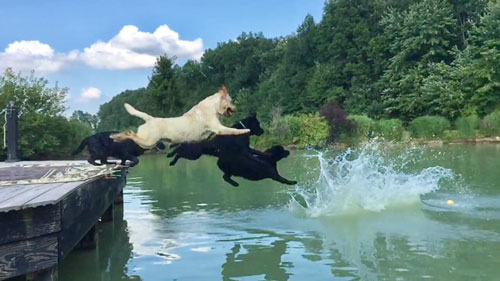Dallas-Ft. Worth Labrador Retriever Club...
DFWLRC -The Dallas- Fort Worth Labrador Retriever Club. Caring for a Labrador Retriever
Labrador Retrievers are known for their friendly nature, intelligence, and versatility. As one of the most popular dog breeds worldwide, they make excellent family pets, service dogs, and working dogs. Caring for a Labrador Retriever involves meeting their physical, mental, and emotional needs to ensure they lead a happy and healthy life.
Feeding and Nutrition
Balanced Diet
A balanced diet is crucial for maintaining your Labrador's overall health. High-quality commercial dog food formulated for medium to large breeds generally meets their nutritional needs. Ensure the food contains the right balance of protein, fats, carbohydrates, vitamins, and minerals.
Portion Control
Labradors are prone to obesity, so it's important to monitor their food intake. Follow the feeding guidelines provided by the dog food manufacturer and adjust portions based on your dog's age, weight, and activity level. Avoid overfeeding and limit treats to no more than 10% of their daily caloric intake.
Hydration
Always provide fresh, clean water for your Labrador. Proper hydration is essential for their overall health, especially after exercise or in hot weather.
Exercise and Physical Activity
Daily Exercise
Labradors are energetic and require regular exercise to maintain their physical and mental well-being. Aim for at least one hour of vigorous activity each day, such as walking, running, swimming, or playing fetch.
Mental Stimulation
Mental stimulation is just as important as physical exercise. Engage your Labrador in activities that challenge their mind, such as puzzle toys, obedience training, and interactive games. Providing mental stimulation can prevent boredom and reduce destructive behaviors.
Playtime
Playtime is essential for bonding and socialization. Labradors enjoy interactive play with their owners and other dogs. Socializing your Labrador with different people, animals, and environments helps them become well-adjusted and confident.
Grooming
Coat Care
Labradors have a double coat that requires regular grooming to keep it healthy and clean. Brush your Labrador's coat at least once a week to remove loose hair and prevent matting. During shedding seasons, more frequent brushing may be necessary.
Bathing
Bathe your Labrador as needed, typically every two to three months, or when they get particularly dirty. Use a mild dog shampoo to avoid irritating their skin. Be sure to rinse thoroughly to remove all soap residue.
Nail Trimming and Ear Cleaning
Regular nail trimming and ear cleaning are important aspects of grooming. Trim your Labrador's nails every few weeks to prevent overgrowth and discomfort. Clean their ears regularly to prevent infections, especially if they swim frequently.
Health Care
Veterinary Visits
Regular veterinary check-ups are crucial for monitoring your Labrador's health and catching any potential issues early. Schedule annual visits for vaccinations, dental check-ups, and general health assessments.
Preventative Care
Preventative care includes vaccinations, flea and tick prevention, and heartworm medication. Follow your veterinarian's recommendations for a preventative care plan tailored to your Labrador's needs.
Common Health Issues
Labradors are prone to certain health issues, including hip and elbow dysplasia, obesity, and ear infections. Be aware of the signs and symptoms of these conditions and seek veterinary care if you notice any changes in your Labrador's health or behavior.
Training and Behavior
Basic Obedience
Training is essential for a well-behaved Labrador. Start with basic obedience commands such as sit, stay, come, and heel. Consistent training using positive reinforcement techniques helps build a strong bond between you and your dog.
Socialization
Proper socialization from a young age is important for preventing behavioral issues. Expose your Labrador to various people, animals, and environments to help them develop into a well-rounded and confident adult.
Behavioral Challenges
Labradors can sometimes exhibit behavioral challenges such as chewing, digging, and jumping. Address these issues with patience and consistent training. Provide appropriate outlets for their energy and curiosity, such as chew toys and designated digging areas.
Caring for a Labrador Retriever is a rewarding experience that requires commitment and dedication. By providing proper nutrition, regular exercise, grooming, healthcare, and training, you can ensure your Labrador leads a happy, healthy, and fulfilling life. These loyal and loving companions will repay your efforts with endless affection and joy.

